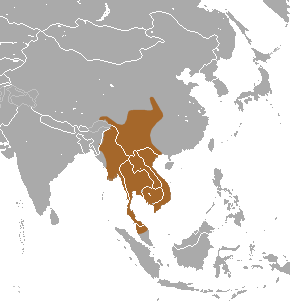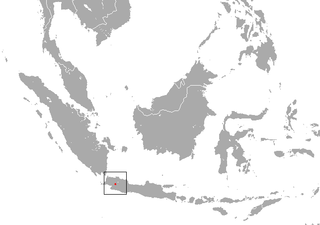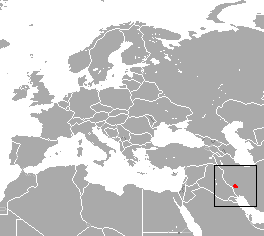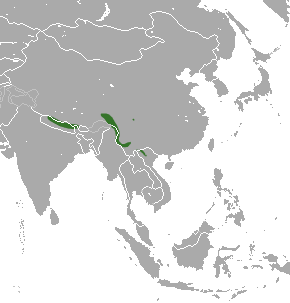
A species that is extinct in the wild (EW) is one that has been categorized by the International Union for Conservation of Nature as known only by living members kept in captivity or as a naturalized population outside its historic range due to massive habitat loss.

The Somali hedgehog is a species of mammal in the family Erinaceidae. It is endemic to Somalia and Somaliland. The Somali hedgehog is nocturnal.

The Southeast Asian shrew is a species of mammal in the family Soricidae. It is found in Cambodia, India, China, Laos, Malaysia, Myanmar, Thailand, and Vietnam.

The Javanese shrew is a species of mammal in the family Soricidae. It is endemic to Indonesia.

The Oriental shrew is a species of mammal in the family Soricidae. It is endemic to Indonesia. It is threatened by habitat loss.

The pale gray shrew is a species of mammal in the family Soricidae. It is endemic to Pakistan. It is threatened by habitat loss.

The Iranian shrew is a species of mammal in the family Soricidae. It is endemic to Iran. It is threatened by habitat loss.

Zarudny's rock shrew is a species of mammal in the family Soricidae. It is found in Afghanistan, Iran, and Pakistan.

The long-tailed brown-toothed shrew is a species of mammal in the family Soricidae. It is found in China, India, Myanmar, Nepal, and Vietnam.

The Lowe's shrew is a species of mammal in the family Soricidae. It is found in China, Myanmar, Thailand, and Vietnam.
Mesoperipatus is a monospecific genus of velvet worm in the Peripatidae family, containing a single species Mesoperipatus tholloni. It is found in Gabon. This species is listed as Data Deficient on the IUCN Red List.
Peripatoides suteri is a species of peripatus in the Peripatopsidae family. It is endemic to New Zealand. The species is listed as Vulnerable on the IUCN Red List.
Speleoperipatus is a monospecific genus of velvet worm in the Peripatidae family, containing the single species Speleoperipatus spelaeus.

Stygobromus is a genus of amphipod crustaceans that live in subterranean habitats. As well as a large number of species in North America, a smaller number of species are also known from Eurasia. Most of the North American species live in areas which were not covered by the Laurentide Ice Sheet, although a few species seem to have survived under the ice. A number of species are on the IUCN Red List as endangered species (EN) or vulnerable species (VU); all the listed species are endemic to the United States. One species, S. lucifugus, is extinct. Stygobromus includes the following species:

Bloomingdale Park is a 138-acre (56 ha) park on the South Shore of Staten Island. It is located in the Prince's Bay neighborhood, and is bounded on the north by Ramona Avenue, on the west by Bloomingdale Road, on the east by Lenevar Avenue, and on the south by Drumgoole Road West and the Korean War Veterans Parkway. It is nearly bisected by Maguire Avenue, but the avenue's two spurs into the park from the north and south do not meet in the middle.
Kinkonychelys is an extinct genus of side-necked turtle which existed in Madagascar during the Late Cretaceous period. It contains the single species Kinkonychelys rogersi, named in honor of its discoverer, Raymond R. Rogers. The genus and species are based on UA 9748, a nearly complete skull, which represents the first turtle skull described from the pre-Holocene era in Madagascar. A number of isolated skull and jaw bones have also been assigned to K. rogersi. These specimens were found in rocks of the Maastrichtian-age Maevarano Formation in the Mahajanga Basin of northwestern Madagascar. Another specimen, FMNH PR 2446, is speculated to represent another species, currently known as Kinkonychelys sp., but consensus on its distinction from K. rogersi remains unclear.












